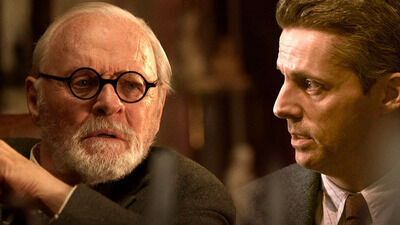Well, two things. One is, I mean, his jokes are just terrible. One of the things that, I mean, Hopkins and I talked about a fair amount was that Freud did have a sense of humor, a strong sense of humor. There was an undertone of laughing at himself, really, laughing at just the preposterous nature of people who have such certain beliefs. I think part of that also was probably Hopkins as much as Freud. And I think the idea that nobody knows, so how can you be so certain?
And then there’s an aspect of somebody that is just like, “This can’t get any worse. I’m in so much pain, I’m dying.” It occurred to me what this film was in a way. It was like when I brought my dog in to say goodbye at the vet, and then I was so crushed, a 14-year-old dog, and then she jumps up and licks me, and I’m like, “Oh, we’re going home.” But we’re not. And that’s heartbreaking. That’s what this is. It’s a manic-ness that’s in him that’s showing up. When we were in the rehearsal period, we really wanted to use that manic energy to get,
like, he lies back down. “Do you want to lie down?” “Sure, I want to lie down. Boom, I’m right back up.” And he’s laughing at himself, and he’s laughing at the situation.

I know that Anthony Hopkins is a bit introverted, and Matthew Goode is not. What was it like as a director to work with both of them?
They’re not much alike, but the one thing that they are alike is they have respect and kindness. They both really do. And when you’re trying to do upwards of seven pages a day at a time, with an actor who is brilliant as he is, he’s 86 years old, he is human, it’s a challenge for him to be able to have the energy to do those super long days and all that memorization, and I think that the kindness and respect that Matthew had allowed us to have a place that we could try things and be creative and make this film possible.
I mean, Hopkins is arguably the greatest living actor, and Matthew is arguably one of the more underrated. His ability to listen and be present — that’s what we really talked about with this Lewis, and it shows up on the screen. You can see everything he’s feeling inside when he’s listening to all this. It’s the gold dust for an actor, and he’s got it.
I know in this culture, these days, people want it to devolve into take a side and bash the other one’s head in, but that was not the story that we were trying to tell. So it was really important that you could feel that sort of burning anger at certain times underneath the facade that Matthew created, like when he’s being attacked to a degree by somebody who’s not well, and I felt that, and that made that scene work.

